Inauspicious instruments, not the tools of the enlightened
Out of all the films I’ve reviewed for The Goods, I’m not sure there’s a single one where my watching was more compromised than Barbarian. I hit the full gauntlet of experience-wreckers: loads of “best of the year!” hype setting unrealistic expectations, big twists spoiled in advance, and the unpleasant bonus of actually feeling sick that night. It’s hard to appreciate structural puckishness when your dinner is eyeing the exit. The surprises landed soft, and I remain thoroughly un-charmed, bordering on annoyed by the film and its warm reputation.
Maybe that one sour screening pushed me too far toward skepticism that had honestly curdled into cynicism toward sketch-comic-turned-horror-auteur Zach Cregger. I walked into Weapons braced for more disappointment despite the early buzz and raves. It felt like Barbarian waiting to happen all over again. But I did my best to avoid my past mistakes, waiting for a day when I was in good spirits and health and avoiding spoilers. And I am legitimately blown away. Weapons is not a disappointment. It’s better than Barbarian in every conceivable way: scarier, funnier, smarter, and much better told. The structural razzle-dazzle and impish spirit all click together with the story being told. And, surprisingly, the story itself is literally told: Cregger opens the film with a narrated summary of the incident that you’d expect to be the thrust of the film itself, priming you for games with time and perspective.
A spoiler-lite overview of the setup: a month before the main action, in the Pennsylvania town of Maybrook, seventeen third-graders exit their homes at 2:17 a.m. like the Pied Piper summoned them. They vanish off the face of the earth. Only one kid doesn’t disappear, a quiet boy named Alex (Cary Christopher). The third-grade teacher, Justine (Julia Garner), becomes the town’s scapegoat and pariah overnight. She finds herself in a stew of emotions: defensiveness, frustration at the mob mindset, and even a bit of guilt that she might have missed some clue. Archer (Josh Brolin), the father of a missing boy, starts his own parallel investigation as the police’s efforts stall out, reviewing grainy security footage and barging in on other parents trying to grieve. Paul (Alden Ehrenreich), a cop and Justine’s former beau, tries to defuse Maybrook tension as his own nerves frazzle. And James (Austin Abrams), a jittery junkie, crashes through the story from a different angle entirely.
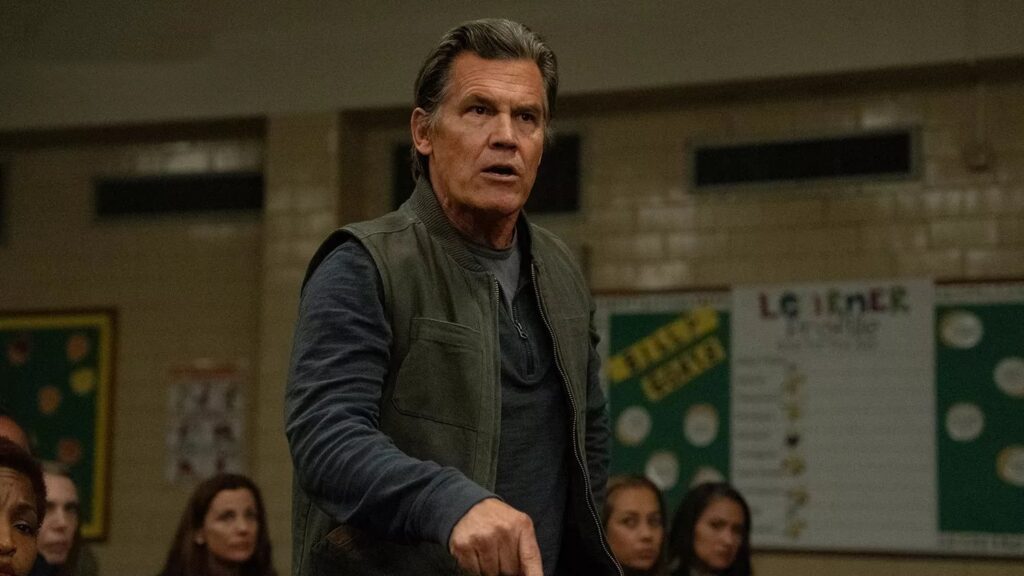
What’s new here (and handled more cleverly than in Barbarian) is how the jarring perspective shifts elevate the story. Cregger revisits key moments and reframes them — sometimes to goose a laugh, sometimes to spike your cortisol. For example, Paul’s early “lonely guy” gesture in a bar with Justine plays straight when you first see it; when the movie swings back around, you realize it was garden-variety horniness the whole time, and the groan that earns is part of the fun.
The chapters aim less for puzzle-box revelations than at creating a broad community portrait; each section is an X-ray of some cultural or psychological force at work in the town in the tragedy’s wake. And the cutting from one chapter to the next is purposeful and the good kind of aggravating: chapters end on punchlines and cliffhangers, then pick up later with a new slant that changes how you hold the whole chronology in your head.
What I admire more than anything else about the film is the way it speaks to the current cultural moment without being on-the-nose or didactic about it. The film’s inciting disappearances echo school shootings: an entire class gets abruptly removed from the world, with the community contorting in grief to assign blame without any mechanism for real justice or reform. Frothing, MAGA-tinted hatred and conspiracy thinking demonize the town as much as any supernatural evil. Cregger threads in a police brutality subplot that, against every one of my instincts, is both provocative and genuinely funny, a series of wince-jokes about a so-called “good cops” bending rules during tough times.
But above all, the film carries the aftertaste of the COVID pandemic and lockdown without ever calling it out: the way the town’s compassion withers under isolation, how victims of an evil plague go sedentary and disconnect from the world, how the need for quarantine becomes an excuse to normalize locked doors and shut blinds. Weapons is about the possibility of times and spaces invisible in this ever-connected and -surveilled world, and the simultaneous relief and terror of that loneliness. It serves as an antidote to the noisy nihilism of Eddington while still capturing many of the same anxieties.
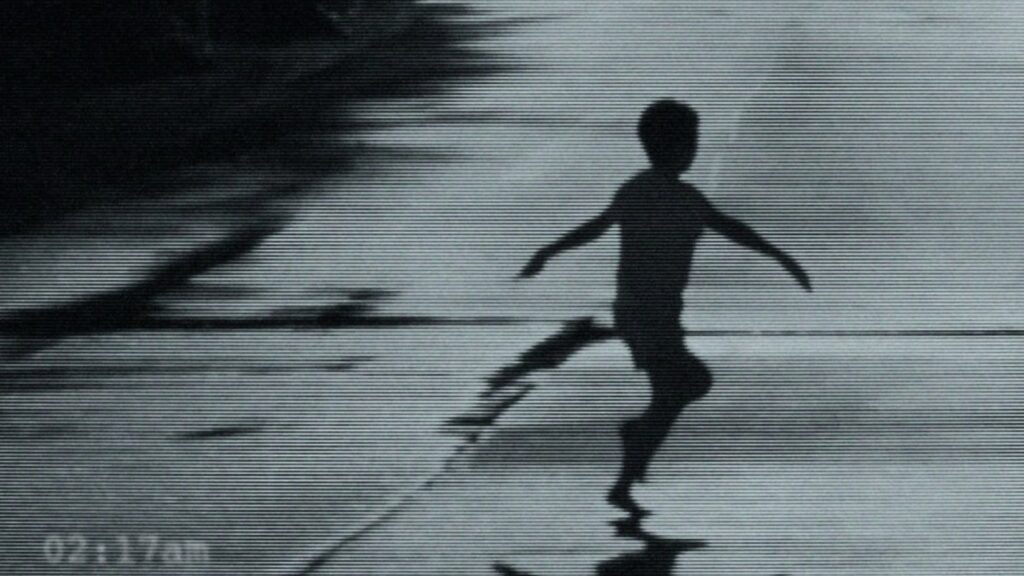
Weapons pulls from a bunch of influences that are obvious but synthesized into a unique whole. The bones are Stephen King: small-town paranoia, kids in peril, adults who fail them because they’re scared and vain and broken. Weapons’ narrative sprawl feels Paul Thomas Anderson-y: a shaggy, interconnected community where everyone has their own little world. Its inspection of various reactions to abrupt loss rending normal families mimics the all-time great TV show The Leftovers. The time-hopping, interlocking, quasi-anthology structure nods to Pulp Fiction, while the surprising use of narration at the film’s opening and ending feels indebted to Jane Schoenbrun. Images of haunted cul-de-sacs and suburban dread masking dark secrets within each house evoke Denis Villeneuve’s Prisoners. The villain’s creepy, clown-esque visage reminds me of Oz Perkins’ recent films or Terry Gilliam: an uncanny “almost human” vibe that’s more upsetting than scary.
And the touchpoints aren’t all cinematic: Cregger has cited the video game series Resident Evil as an inspiration, and some of the over-the-shoulder feeling definitely feels like a horror video game. I’d bet Cregger’s got a manga shelf, too; when characters fall under the story’s malign influence, they sprint with a deliberate, arms-swept-back zeal that’s the Naruto run. And what’s great is that all of these various influences flow together into something fresh.
As horror, Weapons spends its first half in mystery-thriller mode, focused more on suspense and intrigue that spooks. The revelation of the inevitable supernatural elements comes at a slow drip. In fact, some of the biggest jump scares are not monsters, but human situations gone sour, like someone accidentally pricking themselves with a syringe. But once the spooky set pieces heat up, they’re pretty inventive and well-staged, not to mention flavored with skin-crawling weirdness and grossness. One moment ensured that vegetable peelers became a new phobia of mine. But this isn’t transgressive, make-you-gag grossness: the horror violence is never mere spectacle or exploitation, just part of the anxious, destabilizing mood. Cregger’s set pieces are carefully architected and often comic. One of the film’s biggest triumphs is that its climax offers both an apex of tension and also the movie’s biggest laugh (by far), a rambunctious payoff to everything leading up to that had me bursting out laughing.
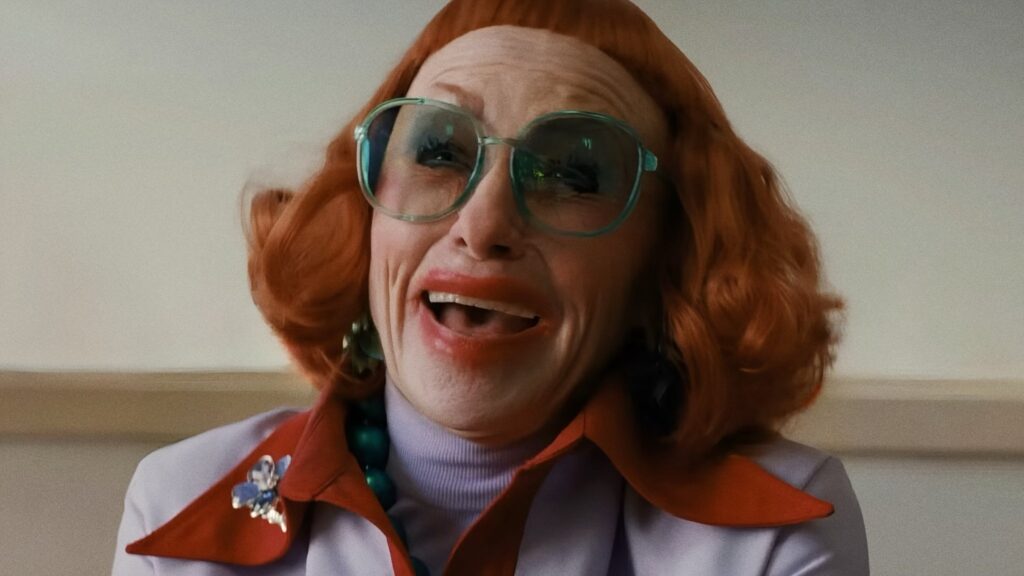
One reason the movie works so well is that it never falls squarely into any common horror or thriller archetypes. You can never say “oh, it’s just a gussied up _____ movie.” It clearly has elements of witchcraft, lampshaded in an early meta-joke when some angry residents literally spray-paint “witch” on Justine’s car, a suspicion the movie has just set us up to have, too. Some of the chase scenes evoke zombie movies, with degraded humans and gory decomposition. The blood-lusting evil lurking in the shadows feels vampiric. The root of the mystery reveals some folk horror, of local myths and spirits haunting the town. Lastly, Weapons sometimes feels like a nasty serial killer movie, the conspiracy theories and amateur investigations a product of the true crime generation. Add those threads to Cregger’s other flavors — the structural pranks, the portrait of grief, the restless humor — and Weapons is both sui generis and fully realized, both familiar and fresh.
The craft team serves the film well. Cinematorgapher Larkin Seiple proves to be a good fit for Cregger’s playfulness, leveraging the ambitious blend of distinct tones and textures the way he did in Daniels’ films: In this case, those visual moods include abyssal basements, Carpenter autumnal moodiness, etc. The sound design is excellent too, with a few key audio motifs recurring, and some hilarious foley effects. I’m a big fan of Weapons’ editing by Joe Murphy especially, keeping the rhythm brisk and energetic, with well-timed jump scares and visual punchlines.
Cregger and his team fill the cast with actors you probably recognize, but none of whom bring superstar wattage: Nearly all the headlining are faces who live somewhere in the blurry zone between lead actor and character actor. Garner is the film’s prickly heart, playing Justine with feistiness that’s a bit worn down. Brolin weaponizes his natural threatening presence with an air of pathetic defeatedness as a grieving dad. Ehrenreich nails the feeling of a dweeb trying to hold it together, like George Michael from Arrested Development ten or fifteen years down the line. The smallest name among the leads is Abrams, who has mostly cut his acting chops in teen comedies and dramas like Do Revenge, and is a twitchy wonder in Weapons. Lastly, the villain, played by Amy Madigan, is terrific: aided by a sensational, unnerving makeup job, the one-time Oscar nominee is a terrific face of false-sweet evil.
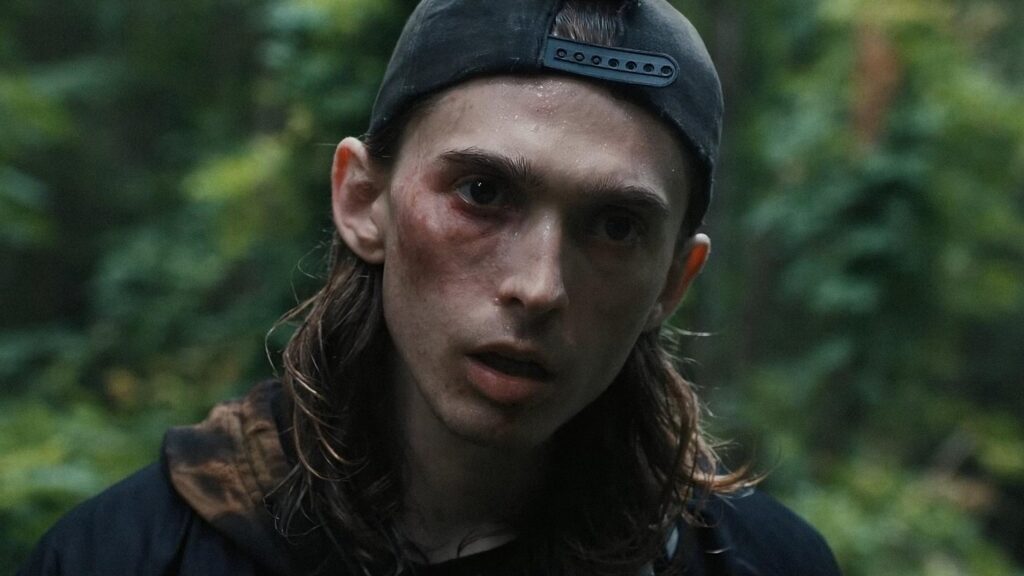
I can’t remember the last time I made such a dramatic U-turn on a filmmaker from their first movie to their second as I have with Zach Cregger. He still has an impish streak and a reflex for defying expectations, and even with my high praise, I think he errs too often on always delivering some surprise or left turn rather than letting a moment develop and breathe. A few plot points had me scratching my head for sure. But the rug pulls this time are savvy, always about scaffolding the story to new heights rather than knocking it down like a toddler with a pile of blocks. Weapons is confident and generous in its storytelling and weird in the exact ways it wants to be.
For now, I’m going to be slightly cautious in my rating below. I’d like to see it again before I declare it a modern classic. But Weapons is among my favorite moviegoing experiences of recent years: a sharp and innovative balance of horror and comedy, biting commentary that never turns into a sermon, and canny instincts about how to be playful while telling a story without ruining it. If Barbarian announced an ambitious provocateur, Weapons makes the case for a filmmaker with real staying power and a wicked sense of when to strike. Right on cue at 2:17.
Is It Good?
Very Good (6/8)
Dan is the founder and head critic of The Goods. Follow Dan on Letterboxd. Join the Discord for updates and discussion.

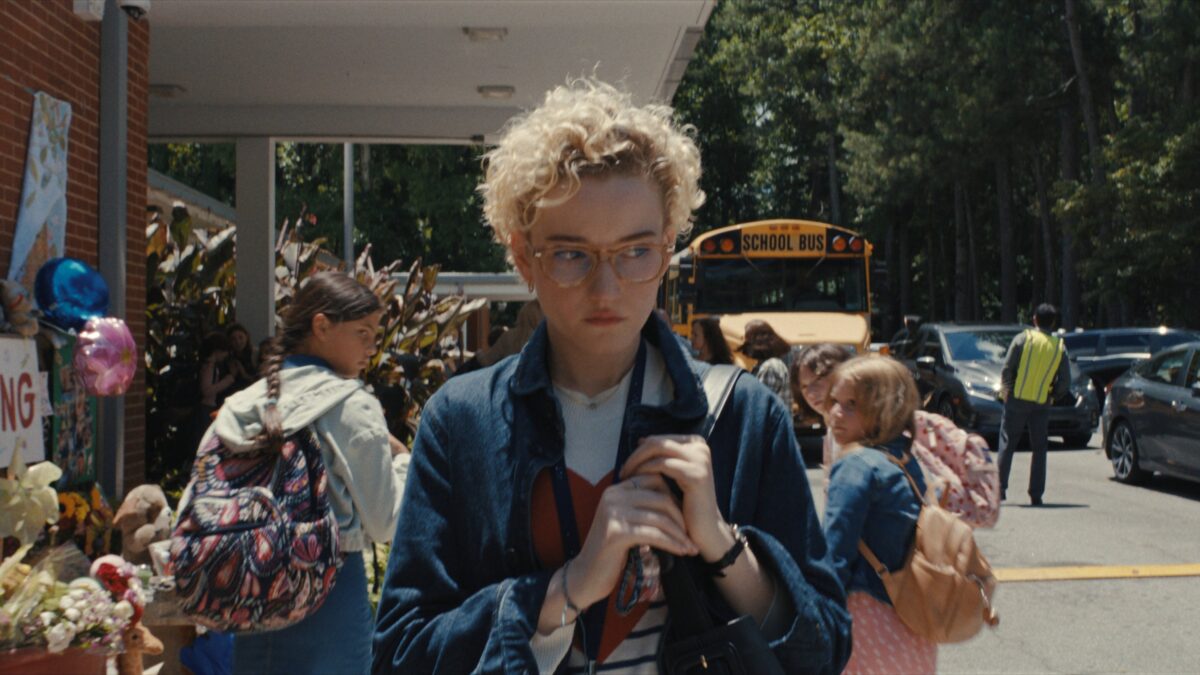
4 replies on “Weapons (2025)”
Been kind of on the fence on this, mainly because I’m for reasons I can’t even begin to articulate I don’t want to do catch-up on Barbarian. (I think it’s something about being burned by a lot of the more hyped-up horror last year, notably but by no means exclusively Longlegs. Then again, catching up on the Terrifiers worked out pretty well.) But, I mean, it does sound pretty cool.
I don’t think it really requires Barbarian, though for me it was instructive in Weapons showing the way the impulses behind Barbarian can be done much better. I never can quite predict what you’ll like or not like, though, so I wouldn’t be astonished if something about this puts you off. It’s a big win for me, though — it would take a really amazing run of films during awards season to keep it out of my top 10.
“What’s new here (and handled more cleverly than in Barbarian) is how the jarring perspective shifts elevate the story.”
Now, this is what has me interested. What put me off Barbarian in a big way was all the structural futzing around; Cregger’s great at staging a scary-basement set-piece, but the jarring shifts in perspective and tone just made it feel to me like he was larding up a stock horror scenario with a lot of extra steps.
I realize I sound exactly how so many of the reviewers and podcasters sounded about Barbarian, so maybe take my rec with a grain of salt, but I’d say give it a try.